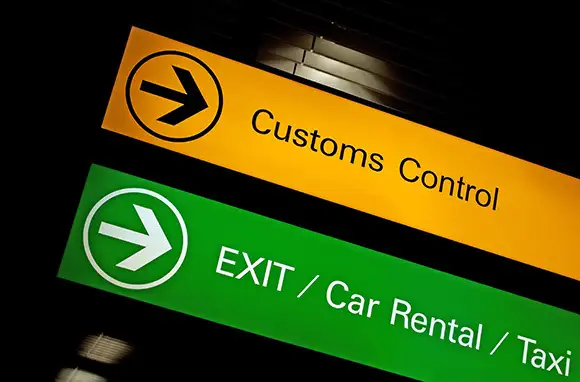
International security standards and procedures are as varied as the countries to which they apply. The tangled network of shifting rules differs by nation, route, airport, airline, or (as it sometimes seems) the fleeting mood of the screener going through your stuff. What’s a traveler to do? We’ll say it several times in this article: When journeying abroad, contact your airline or refer to your arrival airport’s official website for specific information regarding local laws. But before you do, find out which general airport security rules you should be aware of wherever you’re headed.
Image Gallery
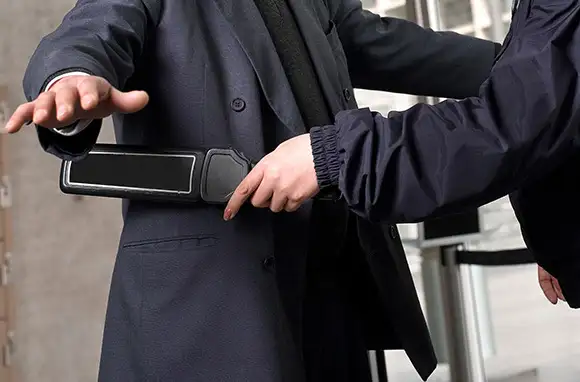
Patdowns
In France, airport security personnel are prohibited from touching passengers without a police officer present. Israel swings the opposite way, with behavior-based profiling carried out by well-trained security officers. And courteous Canadian security officers, who fall somewhere in the middle, perform "polite" patdowns when necessary.
In a nutshell, don't expect the same patdown protocols at every airport. But no matter where you are, be respectful and calm, and follow the necessary carry-on rules (more on those later) and security procedures. If you're worried about, say, encountering hard-boiled officers on an upcoming trip to Tel Aviv, some familiarization will help alleviate fears. (Here's an interesting article on the Israeli security model from The New York Times.) A look at the airport website for your destination should turn up information about the security experience that's in store.

Patdowns
In France, airport security personnel are prohibited from touching passengers without a police officer present. Israel swings the opposite way, with behavior-based profiling carried out by well-trained security officers. And courteous Canadian security officers, who fall somewhere in the middle, perform "polite" patdowns when necessary.
In a nutshell, don't expect the same patdown protocols at every airport. But no matter where you are, be respectful and calm, and follow the necessary carry-on rules (more on those later) and security procedures. If you're worried about, say, encountering hard-boiled officers on an upcoming trip to Tel Aviv, some familiarization will help alleviate fears. (Here's an interesting article on the Israeli security model from The New York Times.) A look at the airport website for your destination should turn up information about the security experience that's in store.
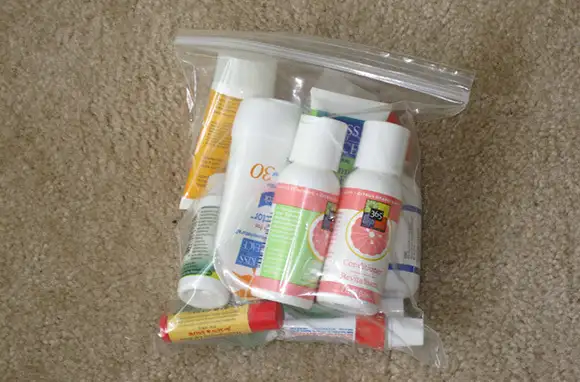
Liquids And Gels
Restrictions concerning liquids and gels in carry-on bags are largely standard around the world. Most countries have adopted the security policies in place in the U.S. and the European Union (E.U.), which, for the time being, require that liquids, gels, and aerosols be in containers no larger than 100 milliliters (about 3.4 ounces), and those containers must be inside a single, clear, 1-liter zip-top bag. In addition to the U.S. and the E.U., these rules apply in the U.K., Canada, Australia, Japan, Hong Kong, China, New Zealand, and dozens of other nations. (Generally, there are allowances for liquids that are medicines, as well as baby food, formula, and breast milk.)
There are some exceptions, however, especially among less-developed nations. In Nigeria, for example, liquids and gels are totally banned—no matter the amount—on departing international flights. They're also entirely banned in carry-on luggage on flights departing from India. Confused? Contact your airline. In my experience, airline websites (as opposed to tourism-board or government websites, which are hit-or-miss) tend to be some of the best sources for information on local airport security regulations.
In Europe, the liquid and gel rules will soon go the way of Pan Am; we'll get to this in the next slide.
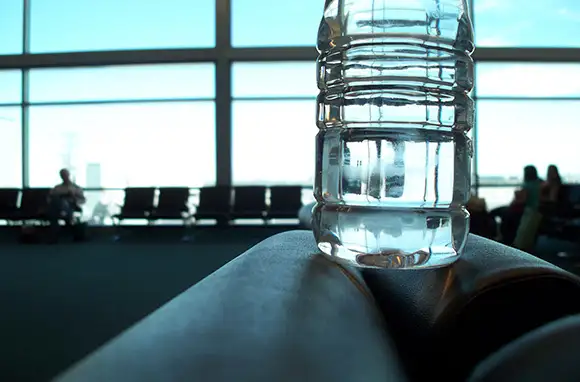
Europe's Liquid Ban: Facing Extinction
Soon, travelers carrying bags stuffed with shampoo, mashed potatoes, and Evian bottles galore will be permitted to jet around most of Europe, hassle-free. The E.U. plans to phase out its ban on large containers of liquids and gels onboard aircraft.
The ban was originally set to expire in April of this year, but the new, more relaxed carry-on rules have been postponed to January 2014. The E.U. still plans to screen all liquids and gels, though. With the implementation of more innovative screening technology that can spot fluid explosives, security officers will be able to detect dangerous substances without needing to confiscate your bottle of Purell.
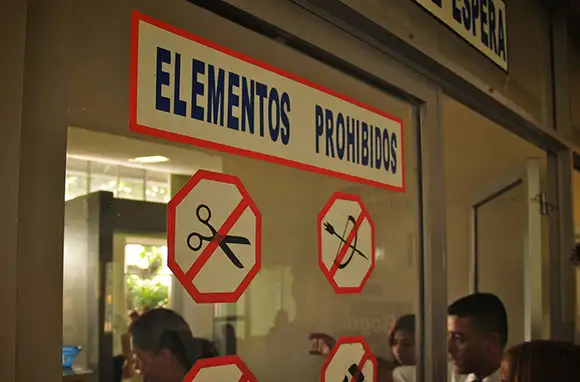
Prohibited Items
Most countries publicly list the items that are prohibited onboard planes and in checked baggage (in overseas destinations, "carry-on baggage" is often called "hand luggage"). If you're planning a multicountry or multicontinent jaunt and you plan to pack something pointy, it's particularly important to browse the prohibited-items lists for your destinations.
But overall, the prohibited-item menus for most developed nations have much in common, with the exception of generally minor details. In the E.U., passengers are permitted to bring knives, scissors and screwdrivers of up to six centimeters in length onboard planes in carry-on luggage; in the U.S., sharp knives are totally prohibited (at least, until next month), scissors must be no longer than four inches in length, and tools must be less than seven inches in length.
Honestly, you only really need to know this stuff if, for whatever reason, it's imperative that you bring cutting sheers or a Phillips head with you on your travels. Otherwise, play it safe and leave the sharp objects in the garage. There's no guarantee that the stern-faced security officer you encounter will be considerate enough to employ a ruler.
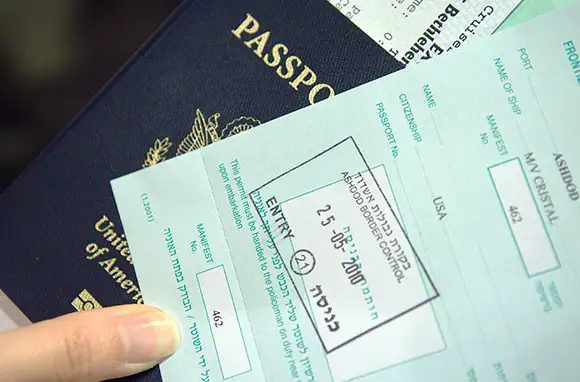
Passport Stamps
Unfortunately, you may run into trouble going through security when arriving in select Middle Eastern destinations if your passport bears an Israeli stamp. Security officers working in countries on poor diplomatic terms with the state of Israel—like Iran, Syria, or Lebanon—have been known to prohibit travelers with Israeli stamps from entry. (Rumor has it that an Israeli stamp will cause problems in Egypt, Turkey, and Morocco; this is by and large false.)
When visiting Israel, you can ask the immigration officer not to stamp your passport, and you shouldn't have any problem with this request. The officer will customarily stamp a separate piece of paper for you to use as your visa while there. This raises some ethical questions, but the choice is ultimately a personal one. Blogger Chris Gray Faust of Chris Around the World opted out of her stamp at Tel Aviv's Ben Gurion Airport, yet not without reservations. According to Faust, "It bothers me that [some] Arab countries place restrictions on travelers like this, forcing them to choose … On the other hand, I don't want to limit my world explorations if I don't have to."

Duty-Free
There are generally three scenarios here. Option one: You are permitted to carry on liquid goods purchased after you've gone through the security checkpoint in a tamper-proof bag. Option two: Your purchases must be delivered directly to your plane. Option three: You may not bring any duty-free liquids larger than 3.4 ounces onboard, period. And if you try, they'll be confiscated.
Which alternative will you face? It depends where you are. On flights within the U.K., for example, you'll receive a sealed bag containing your duty-free purchase to carry onboard your flight. Keep your receipt (it proves where and when you've purchased your items) and be sure not to open the bag, and all should go smoothly. Find more information on your airline or airport website. Or ask airline or airport staff—not the salesclerk from which you're purchasing goods in the airport—if you can bring duty-free liquids onboard the plane in your carry-on bag.
Have you had trouble with airport security rules in other countries? Share your experiences in the comments!
More From Smartertravel:
We hand-pick everything we recommend and select items through testing and reviews. Some products are sent to us free of charge with no incentive to offer a favorable review. We offer our unbiased opinions and do not accept compensation to review products. All items are in stock and prices are accurate at the time of publication. If you buy something through our links, we may earn a commission.
Related
Top Fares From Columbus, OH
Today's Top Travel Deals
Brought to you by ShermansTravel
Shop and Save with Country Inns...
Patricia Magaña
 Hotel & Lodging Deals
Hotel & Lodging Deals
$229 -- Chicago: Discounted Rates and...
Francesca Miele
 Hotel & Lodging Deals
$229+
Hotel & Lodging Deals
$229+
$188 -- Honolulu: Save on Oceanview...
Abigail Lamay
 Hotel & Lodging Deals
$188+
Hotel & Lodging Deals
$188+



